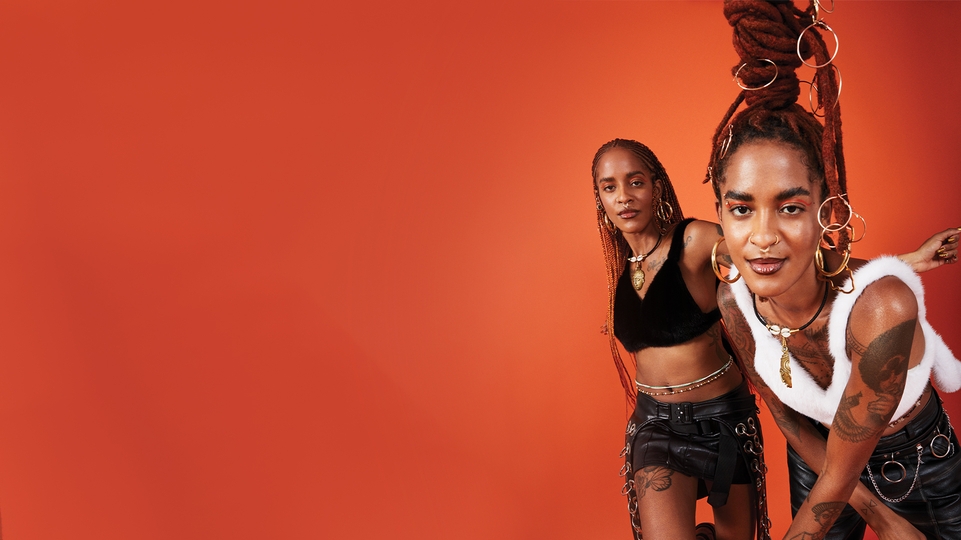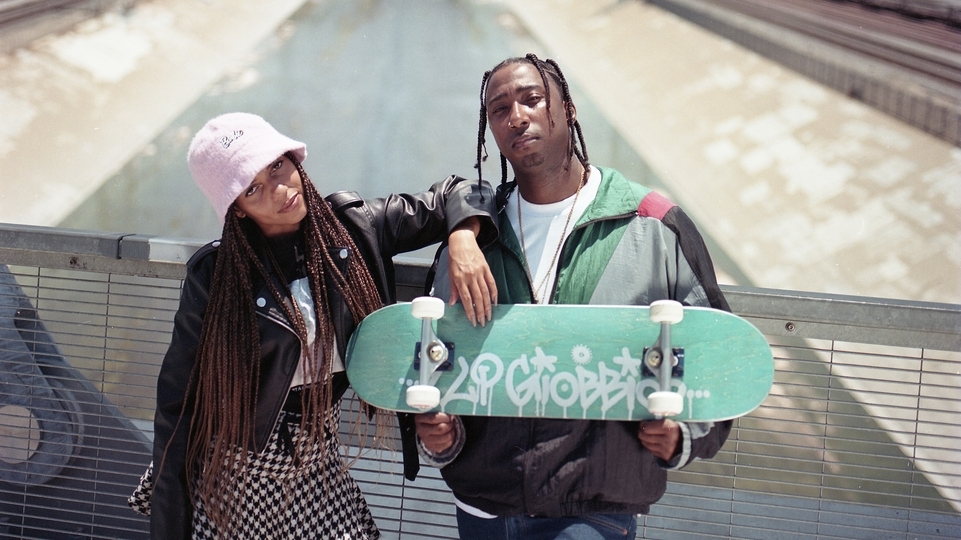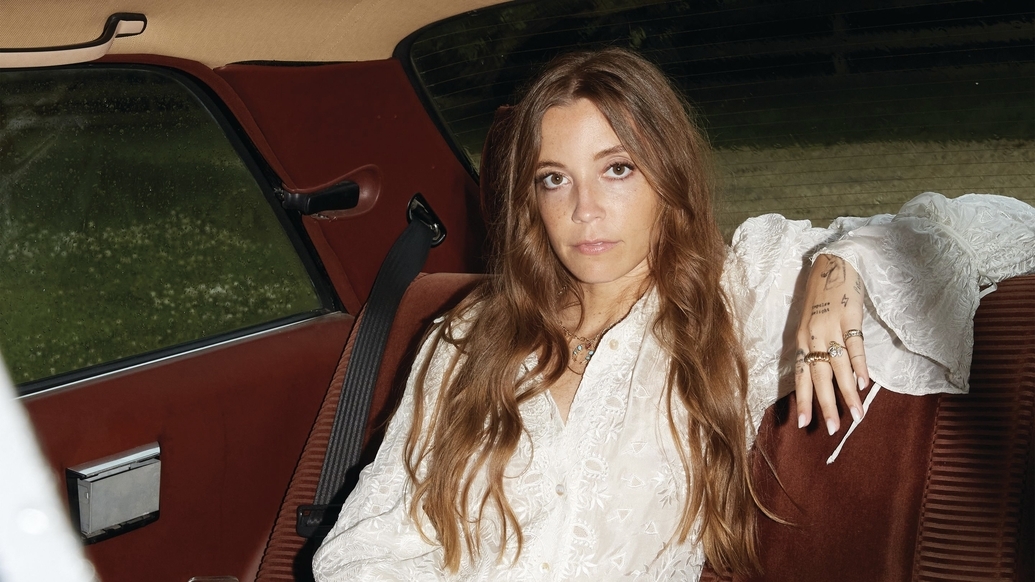
LP Giobbi: life in the major key
Some artists spend their careers in a single lane, but LP Giobbi views each aspect of her craft as critical movements that culminate in a symphony of success. We caught up with this year’s Best Producer winner to learn more about the connections she’s forging between subcultures through her diverse discography, piano-laced live sets, and a relentless enthusiasm for building empowering dance music platforms
“YES, YES, YES.” Guests who cross through the gates at Oregon Country Fair are greeted by this resounding phrase of consensus. The exuberant words are displayed on a sign that hangs above the entrance, inviting visitors to accept all the joyous possibilities that await them at the arts and music festival that takes place each summer. This sanctuary and its unofficial catchphrase hold a special place in Leah Chisholm’s heart.
“I’ve been going every year since the womb — I haven’t missed it, and I never will,” she tells DJ Mag with a toothy grin. In 2023, the artist better known as LP Giobbi will return to her stomping grounds, but not as a spectator — she’ll become the first electronic act to headline the homegrown gathering in its more than 50-year history. “The elders — that’s what they call the older hippies — are going to be pissed,” she adds with a laugh when we speak ahead of the non-traditional slot. “I’ll probably get some backlash, but it’s fine.”
Of course, it will be. Our cover star relates to the crunchy crews who flock there more than most. That’s why she’s planned an experience they won’t be able to resist — it’s called ‘LP Giobbi Presents: Dead House,’ wherein the keyboardist, producer and DJ blends live reworks of The Grateful Dead’s classics through a distinct, four-on-the- floor lens (there are selections from Jerry Garcia’s solo album too, which she remixed after being asked personally by the late guitarist’s daughter).
Staying true to the iconic band’s roots, she reserves ample moments to improvise on the keys, ensuring that even the most skeptical “elders” are left swaying in bliss. Yes, it will be totally fine. The daughter of Deadheads, LP became an honorary inductee at birth, and some three decades and change later, is a fan herself — albeit in a slightly more professional sense. This season, she’s slinging that same style of show at The Dead & Co.’s official afterparties — hangouts reserved for the diehards who come first to catch founding members like Bob Weir conjure psychedelic realms alongside the band’s newer additions like John Mayer.
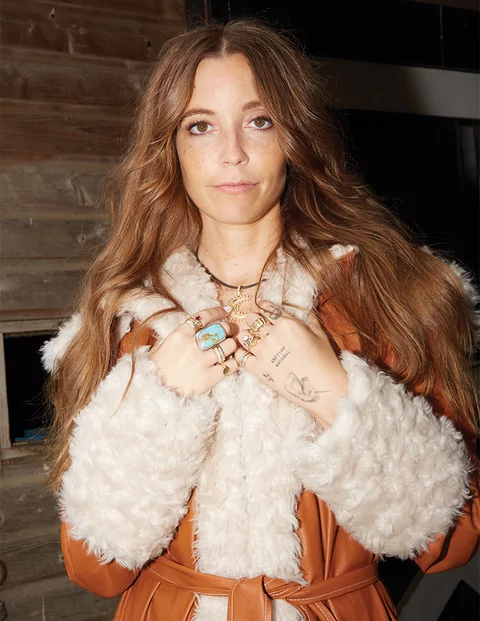

When we catch up with LP on an afternoon video call, the Fair is still a few weeks out. She’s just wrapped up the “All In An Airstream” tour to lesser- traveled locales alongside DJ Tennis, and now she’s in arguably the most-traveled destination — New York City — preparing for a Dead House set at a sold-out Brooklyn Bowl. “I approach these by asking myself, ‘how would The Grateful Dead use this gear?’ and honestly it’s been so much fucking fun. There’s wompy, crossover electronic artists like Pretty Lights and Gramatik — but there’s never been a house act,” she shares, noting the niche she’s carved out among a limited cohort of producers who appeal to riff fiends and knob nerds alike.
The project emerged from the pandemic era when daily streams provided LP with an outlet to reach beyond her typical piano house discography and into the more noodley corners of dance music. During lock- down days, she infused her online sets with the nostalgic guitar licks and mellifluous progressions that reminded her of home, but it wasn’t until LP and Bob Weir coincidently appeared on the same lineup for a virtual fundraising concert that her Dead-themed live show began to take on a life of its own.
“Now, when I do Dead House sets, I get all these parents and their kids — and family is everything to me,” LP says, putting her hands over her heart. “I get comments like ‘This is the first time we’ve shared a show together because it’s so rare to find something we both like and understand,’ and that’s the biggest compliment I could ever get!” While many artists would consider launching an alternate alias to entertain fanbases in separate silos, that’s just not LP’s style. Doing so would suggest that her output necessitates segregation, and this clashes with the inclusive message that’s been a hallmark of her personal brand and her Femme House platform since day one.
“Dance music is all about positioning, and so it can be dicey to try to figure out, well who are you? What are you doing? But at the end of the day, what I’ve learned — and this is a recent awakening — it’s just so who I am,” she says of the unique space she inhabits at a musical nexus. “I just feel like when you’re your most authentic self is when you really find your fans.” Clearly, she has plenty of those — after all, DJ Mag’s readers picked LP Giobbi as the Best Producer in this year’s DJ Mag Best of North America poll. While supporters are fabulous to have, artists rarely get this far without finding their biggest fan from deep within. That sense of empowerment has lent itself to a hell of a year for our subject, and one that’s only gaining momentum from here. With a Deluxe Edition of her ‘Light Places’ debut album on the way, as well as a new imprint on one of the world’s leading dance music labels to arrive this fall, LP is living her life in major key.
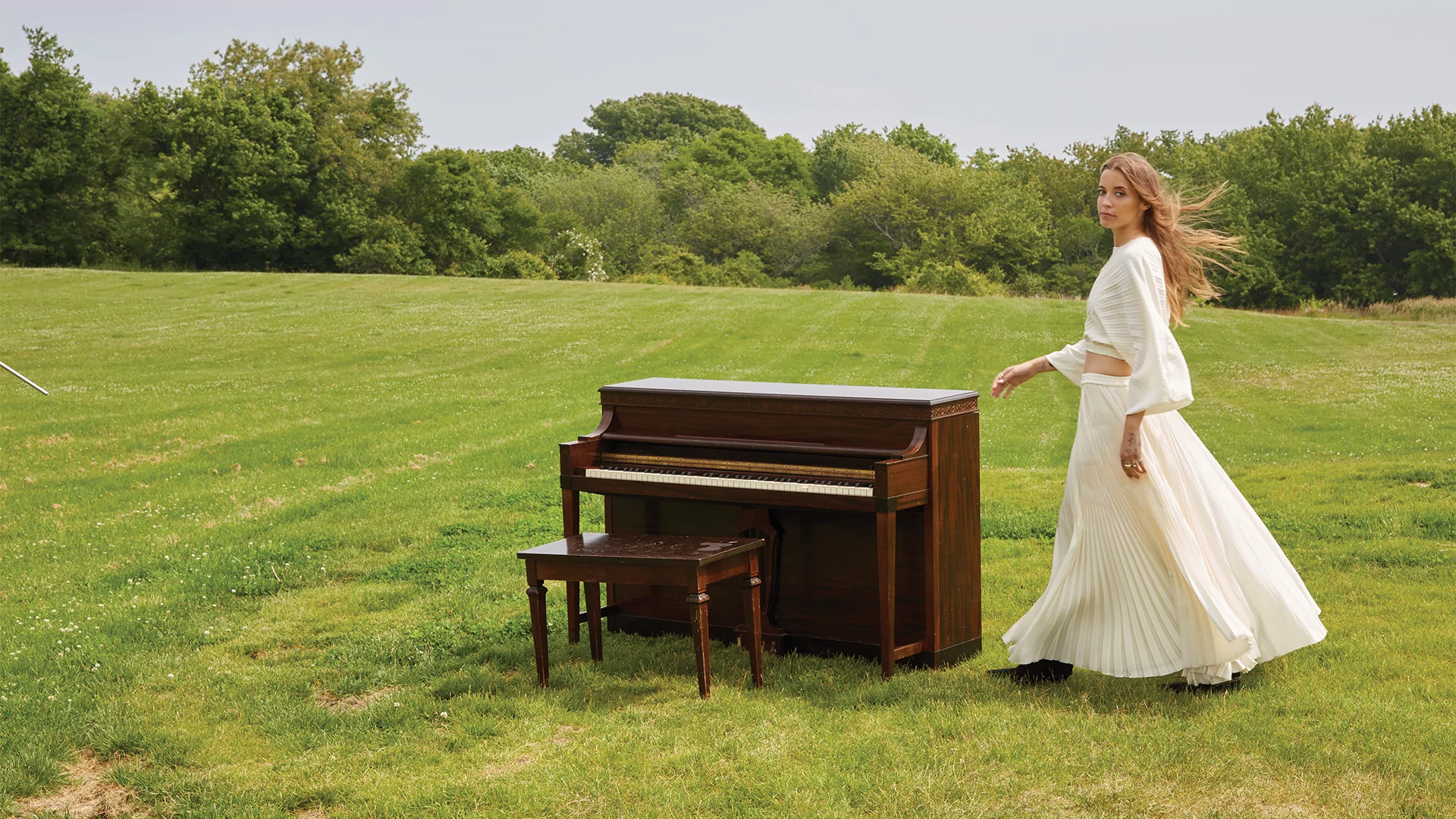
Chords Born and raised in Eugene, Oregon, LP was surrounded by a loving family who harbored a deep appreciation for art. “My parents aren’t musicians themselves, but they just cultivated such a love of live music — we went to so many concerts as a family, and going to a concert was about being part of something greater than yourself,” she shares of her lively upbringing. “It was our church.” Naturally, one of her formative memories took shape at a show led by The Grateful Dead’s longtime drummer, Mickey Hart. “He had this beautiful Black woman as the singer, and he was playing percussion, obviously,” she recalls. “I just remember being in the very front row, dancing my ass off and twirling and just feeling so free and so happy.”
By age seven, following many of these family outings, LP knew she wanted to play piano. “I guess I’ve always been this way, but I’m sort of a bulldozer. Like, I will not stop until I get what I want,” she admits, detailing the ways she’d broach the topic of lessons with her mom and dad on the daily. Eventually, they buckled under her constant requests. “I always say I won the lottery twice — once when I was born to my parents, and then once when I got Carolyn Horn as my piano teacher,” LP shares with a smile. Horn typically worked with older students, but she agreed to an in-person meeting to see whether a hopeful LP could be an exception to the rule.
“I remember thinking, ‘okay, you have to impress this woman or else she’s not going to take you as a student.’ So, I wore my best jester hat and these horrific neon biker shorts with overalls on top.” She pauses to let out a wide-eyed squeal in memory of her slammin’ pre-pubescent fashion sense. “I walked into the meeting, and it was like our souls collided.” From second grade until high school graduation, Monday nights were spent on the bench with Horn, first learning the basics and eventually tackling orchestral beasts like the mammoth Grieg Piano Concerto that required nearly four years of study and memorization.
Together, they developed a connection that LP defines as singular in her lifetime. “Some days we would just play the inside of the piano,” she shares of evenings with her early champion. “Some days we would play the bongos, and other days we would dance or we would just talk. The older I get, the more I realize that having a mentor who is not your parents, who holds up a mirror of ‘you can do anything, you are unstoppable’ is fucking life-changing for a kid.”
After senior year, LP moved to California where she studied jazz piano at UC Berkeley. Despite the distance, she and her teacher remained close, continuing to meet up even after Horn was diagnosed with Alzheimer’s Disease. (She sadly passed away in May, and in her will she bestowed to LP her ultra-rare Bösendorfer piano.) “If it’s a good show, there’s usually a moment where I’m playing the piano and she comes to me and I can just hear her,” LP reveals, with a palpable crack in her voice. “If she was ever able to see the iteration of this, she’d be standing side stage, screaming, hooting, hollering and howling, probably. She would love it, and one of my saddest realizations is that she’ll never see it.”
Recently, LP made a trip home to help clean out her beloved instructor’s house where she was reminded of the surprising parallels in their lives. “At around 60, she went back to school and got a degree in electronic music at the University of Oregon — she was the only female in her class, was the only person over 20, and ended up dominating!” she exclaims in awe. “I was reading an article on everything that she had done in the electronic space, and this was what? 20 years ago? And I just thought, ‘damn, this really subconsciously must have had a massive impact on me.’”

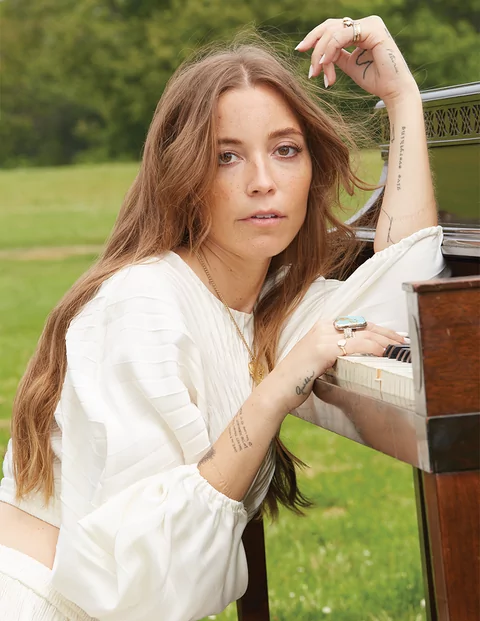
It would be some time before LP would breach the electronic realm herself, but early on she was certain she’d become someone in music. She read Bill Graham Presents (the pioneering rock promoter’s biography) in college, and became fascinated with his savvy. Upon discovering that Graham’s colleague Gregg Perloff had opened an office down the street from her apartment in Berkeley, LP headed that way with another fresh bulldozer of a plan.
The soon-to-be graduate rang the buzzer and fabricated a story about a scheduled meeting with the bigwig. She moved swiftly down the hall before his associates had time to question whether the 20-year- old girl was who she claimed to be. “Right then, Gregg came out of his office, so I walked over and I said, ‘I know that you’re probably going to call security in a few minutes, but please read this letter. I know I’m supposed to work here. I’m destined to work here,” she says of her entry-level heist. The sneaky plan paid off — Perloff gave her a job on the spot, and soon she was working in marketing for Another Planet Entertainment, North America’s largest independent promoter. “That’s where I learned about the music industry,” she says. “I feel so grateful to understand that part of it, because if you’re going to make this a career, you do have to know the business side.”
The position required her to spend time in venues and collaborate with agents and other professionals, one of whom brought her to a electronic show she’ll never forget — house producer Tornado Wallace at San Francisco’s Public Works. “I remember getting to the club and thinking, ‘it sounds like there’s a drummer and maybe even a singer and a synth player, but there’s just one dude up there.’ The concept of being a DJ — that was so confusing to me,” LP admits. Her companion that night summed up the swirling electronic soundscape in words instantly understood — “It’s body music,” he offered.
“I had just graduated with this degree in jazz piano performance, and something happened to me in college, which is unfortunate, because jazz is definitely meant to be felt. But I just started intellectualizing everything. I was using my head instead of my heart, and as I stood there I actually couldn’t even dance because I was so blown away by what was happening.” Something activated — after years of agonizing over music theory’s intricacies, LP found herself casting the technical elements aside to indulge in a full-body, sonic experience. “In that moment, I felt really tied to my parents, even though this was extremely different music,” she recants of her revelation. “I saw this is what we’re all searching for — the community, the dancefloor that was full of freaks and weirdos who have a safe space to feel alive. I just wanted that.”

LP was hooked. Soon she discovered Ableton Live courses where she could meld her love for the piano with her fiery passion for beat-driven “body music.” It felt right, even though she couldn’t ignore the fact that she was the only woman student in class (a reality that would eventually spur her to launch the Femme House nonprofit production school for marginalized genders in dance music alongside co-founder, Lauren Spalding, aka Hermixalot.) Before she could become truly comfortable with the craft, she had to break the counterproductive habits that formal training had burned into her brain.
She points to longtime friends Sophie Hawley-Weld and Tucker Halpern of live electronic duo SOFI TUKKER as helping her shape her earliest DJ techniques, and to an extent, her productions. “Tuck would give me amazing notes as I tried to make songs for myself, that were fucking horrible at first,” LP recalls. “He’d always say, ‘You’re using too many notes — what are you actually trying to say?’ So, I spent the next four or five years, sort of unlearning everything I learned in school.”
She stumbled upon some hits in the process — take 2018’s ‘Amber Rose,’ with its funky drums, brazen horns, and classic house energy, centered around a powerful spoken word vocal by the aforementioned Spalding aka Hermixalot. ‘Take My Hand,’ which arrived via the Animal Talk imprint in 2021 meshes jubilant keys with soulful samples for an anthemic result that still sets any room off. But LP insists singles from her breakthrough era weren’t quite as influenced by her secondary education as the tunes she’s made recently.
“It wasn’t until this album ‘Light Places’ that I trusted myself enough to be like, ‘okay, you can use a diminished chord if you’re using it because you want to build tension and then you want to release it, and not just because you want to show people how smart you are,’” she shares of finding flexibility in her process. “It really had to be intentional, and took me a long time to bring the jazz knowledge into this newfound understanding of dance music.”
‘Light Places’ arrived via Ninja Tune’s Counter Records on May 12th, and it’s an emotional collection that captures its creator’s exceptional range in one fluid package. Though it has drawn critical acclaim, it wasn’t the kind of project LP Giobbi had in mind for herself when she first fell in love with clubland. “When I entered the dance space, it was freeing not having to think about making an album, not having to make a world and art for it,” she says matter-of-factly. “As a dance artist, you get to make a track, put it out, you DJ with it. Actually, that’s what sort of drew me into pursuing a career in it.” That all changed when one BBC Radio personality burst her bubble — bigger things were in store, whether she liked it or not.
“Pete Tong told me, ‘You know, you’re an album artist. If you want to be — you are,’” LP retells of their exchange, letting out a sigh that conveys the gravity of her realization. “I started seeing myself differently and conceptualizing myself differently and thinking, ‘okay, are you gonna make a body of work that could live together?’” To her credit, these cuts aren’t just living together — they are thriving. Gentle, key-laced interludes make for a listen that’s intermittently wistful and at other times joyously untethered in its playful exploration.
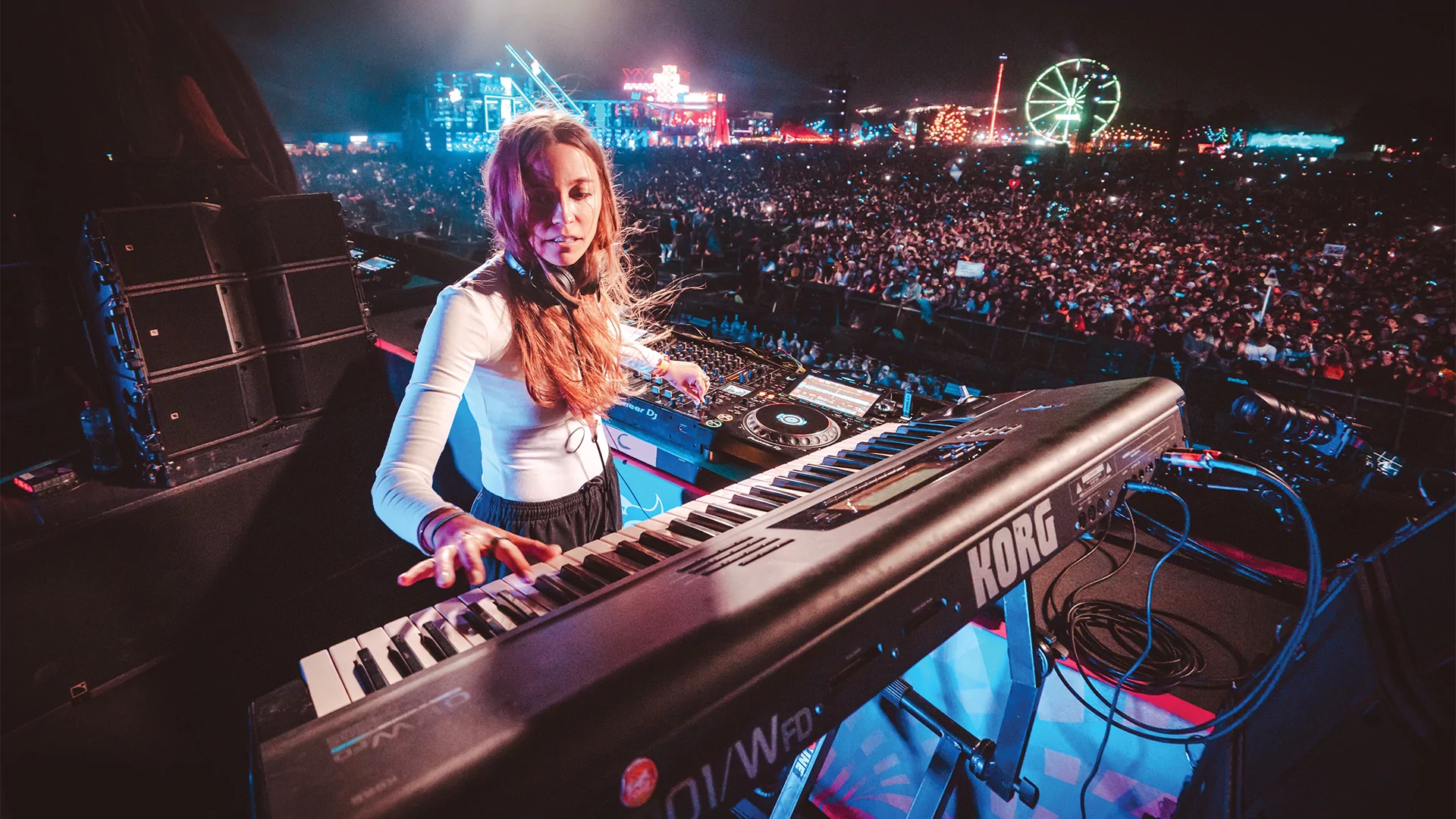
There are sexy vocal melters like ‘If Love Is A Skill’ featuring her influential homies, SOFI TUKKER, and stripped-back jams like ‘All In A Dream’ with DJ Tennis and Joseph Ashworth, which boast an aura of times past — the perfect guitar-kissed groove for a long drive toward desert horizons, or to take the edge off the lingering hours of a particularly introspective acid trip. There are gritty live drums, orgasmic climaxes and quirky characters pulled directly from voicemail. From start to finish it’s a listener’s delight, though not necessarily the kind of collage meant for dark rooms and sweaty dancefloors.
That’s about to change though. On August 25th, fans will get a chance to experience the deluxe edition of ‘Light Places,’ which includes a bevy of souped-up club edits along with studio performance versions of songs, including a reimagining of the luscious ‘All I Need’ by Goose, a five-piece group LP refers to as “the next coming of the jam-band gods.” While the deluxe drop and the official remixes from names like DESIREE, Krystal Klear, Joe Goddard, Anden and Chloé Caillet are sure to keep the album swirling across festival fields and club nights for months to come, LP is already at work on a new venture that celebrates the sensations that drew her to dance music in the first place.
Later this autumn, she’ll be launching her own YES YES YES sub-label on Defected. Its affirming name is obviously a nod to the colorful signs that appear at Oregon Country Fair, but it is also representative of an era in which the freshly appointed label boss is letting her spirit guide her 100 percent. “I love my album. I know how much work it took, and I’m proud that it’s out there in the world. However, after I made it, I freaked out,” she shares candidly. “I was like, ‘wait, this is not actually indicative of the sets I want to be a part of or the lineups I want to play on.’” In search of balance, LP took to the studio with an alternate plan in mind. “I started to only make super underground tracks, like they could not have any vocals, they had to be extremely inaccessible,” she says chuckling at her tendencies (her recent Defected debut ‘Giodisco’ aligns with that ilk thanks to its noticeable lack of lyrics and burning 126BPM rhythms.)
“Look, I’m an extreme person and so um, you know, I maybe swung the pendulum too far that way, but I wanted an outlet for productions that are made for the dancefloor, and [Defected] were super on board.” In addition to carving out a home for the types of house and progressive tunes that European crowds crave, LP is looking forward to helping lesser-known artists gain traction with the support of a trusted name in dance music. “I think it’s hard to make money just releasing music as an underground dance artist, but what I love is that we can offer shows and awesome festivals to the artists that we’re bringing onto the label,” she says. “I’m really excited to be able to link those communities.”
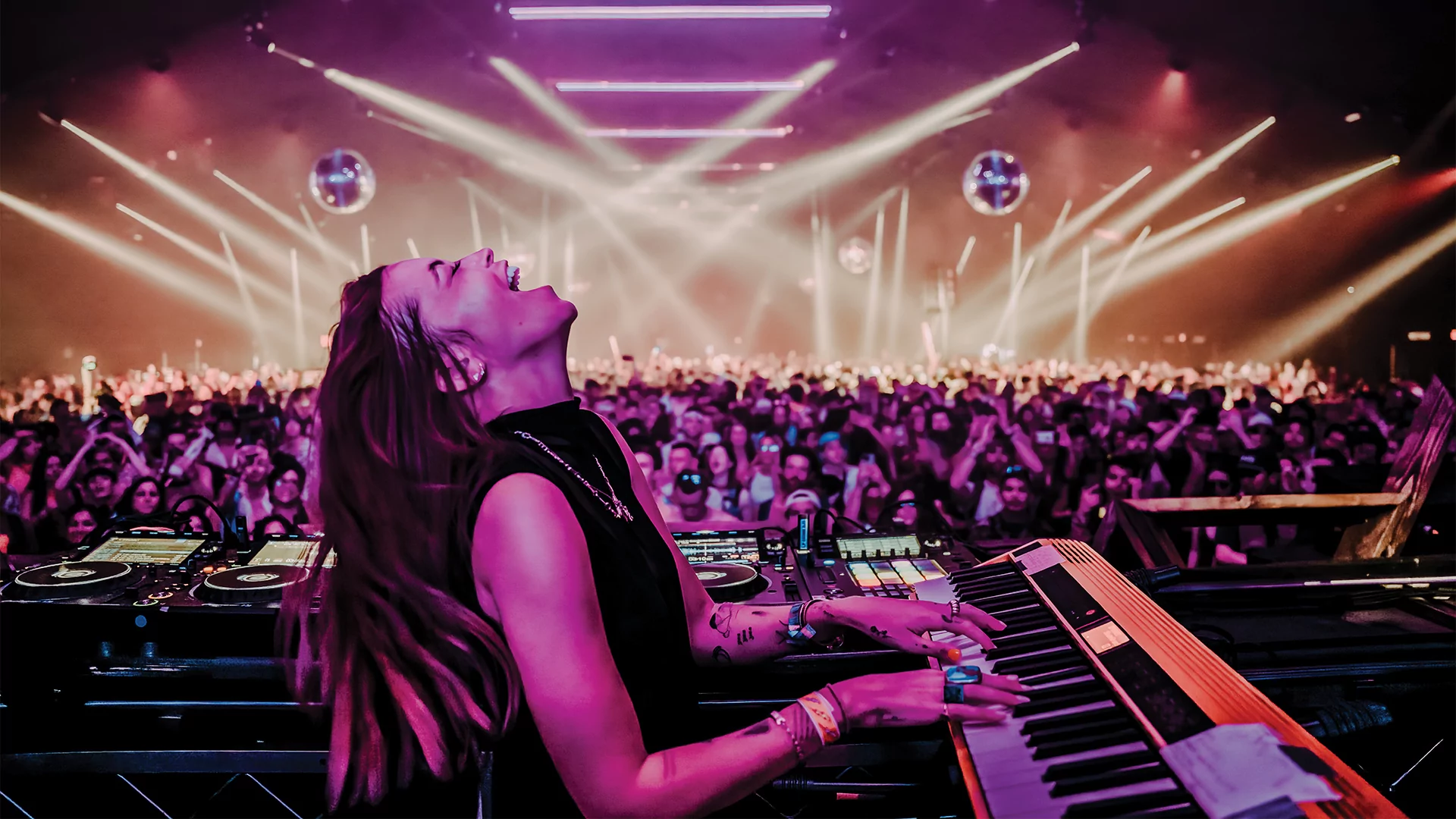
Lifting up others has always been at the top of LP’s priority list, which, if you haven’t gathered by now, is... quite long. When we ask her how she’s able to manage such a toiling docket of responsibilities on top of a touring schedule that includes appearances at Tomorrowland, Creamfields, and venues across Ibiza, she is visibly excited to share her answer. “I have a Word doc on my computer and it’s labeled ‘Piano House Queen / Synth Warrior Goddess,’” she says with a chuckle. “It’s my daily to-do list, and big picture, it’s how I approach the questions: Who do I want to be? What kind of artist do I want to be? And what can I do every day to make sure I’m laying a good brick toward that?”
She reads us her daily schedule, which includes items like “work out while listening to a mix,” “practice piano for an hour,” followed by tasks like crate- digging, working on singles and collabs, or running calls with her regional counterparts for W Hotels (LP continues to serve as Global Music Director for the Marriott- owned brand.) On days when she’s feeling more “Piano House Queen,” she might work on the pop-fueled cuts that fall under that profile. When the “Synth Warrior Goddess” is leading the charge, that’s likely when her new imprint’s releases are getting a little TLC.
LP’s days are long, and she’s learned to make the most of them. “Playing the piano gives me energy to then go and create or work on a song, which gives me energy to crate dig, which gets me excited about music, which then gives me energy to go play a show,” she shares with enthusiasm. “It just feeds itself.” Ultimately, LP strives to go to bed each night knowing that she did everything she could to be the best version of herself. Now, wrap that up with a willingness to say “yes” to the possibilities of tomorrow? Those my friends, are the keys to success.
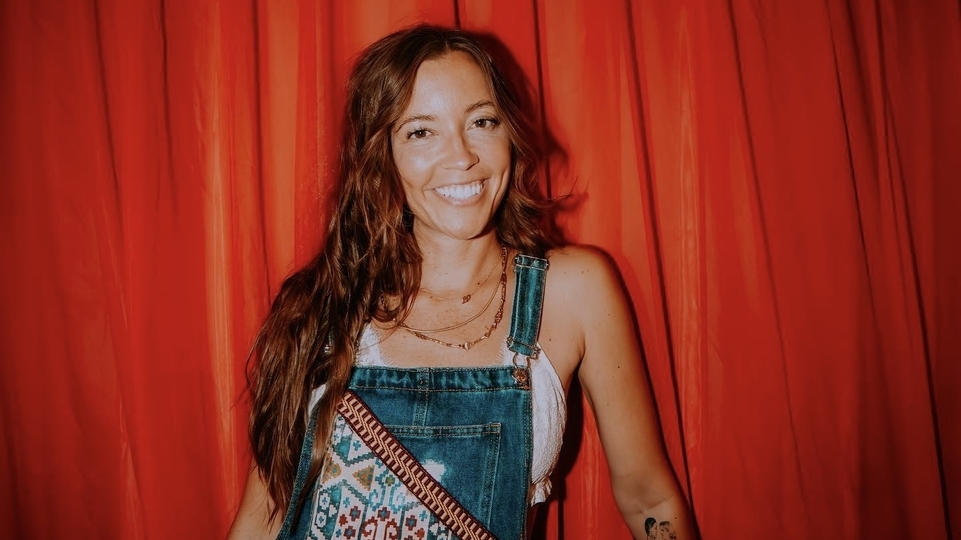
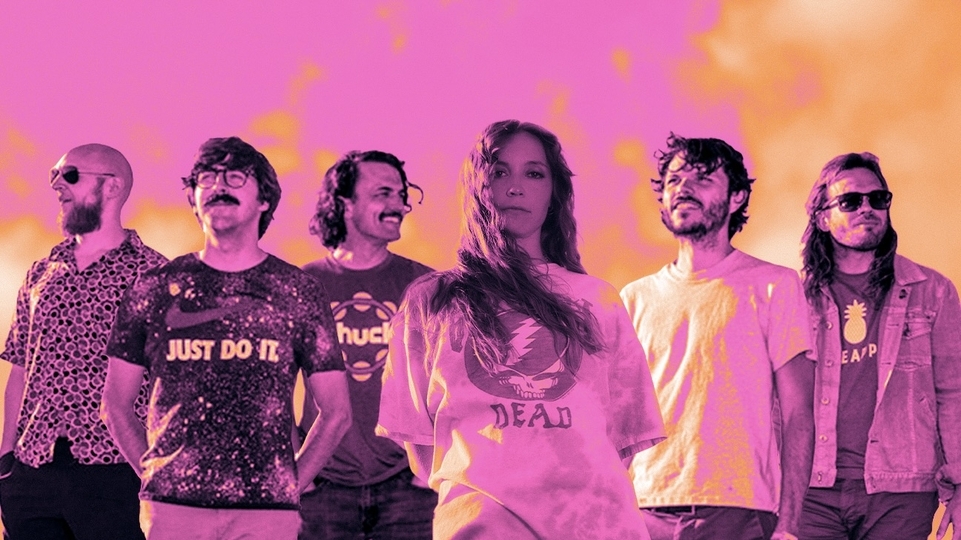

1MB.jpg?itok=W6Q7g5bf)
